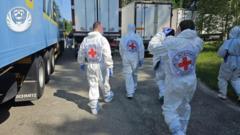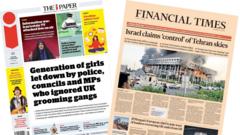How Are Russia and Ukraine Repatriating Fallen Soldiers?

Understanding the Complexities of Body Exchanges in the Ukraine-Russia Conflict
The ongoing conflict between Ukraine and Russia has led to a tragic toll on human life, with countless soldiers losing their lives on both sides. In a recent development, Ukraine and Russia completed a significant exchange of deceased soldiers, marking a crucial step in addressing the grim realities of war. This article delves into the details of this exchange, the challenges faced, and the broader implications of such repatriations in the context of the ongoing conflict.
The Recent Body Exchange: Key Facts and Figures
On a recent Monday, Ukraine announced that Russia had handed over 1,245 bodies, contributing to a staggering total of 6,057 bodies exchanged in just a few days. This exchange has been framed as a significant humanitarian gesture amidst the ongoing hostilities. However, the verification of the identities of these fallen soldiers remains a pressing concern.
According to Ukrainian officials, the identification process is not straightforward. The bodies returned by Russia are often found in a severely mutilated state, complicating efforts to ascertain their identities. Ukrainian Interior Minister Ihor Klymenko highlighted these complications, stating, "Bodies are returned in an extremely mutilated state, parts of [the same] bodies are in different bags." This raises ethical questions about the treatment of deceased soldiers and the respect afforded to those who have sacrificed their lives.
Disparities in Reporting: Ukraine vs. Russia
In the complex landscape of this conflict, discrepancies in reporting are common. While Ukraine reported receiving 6,057 bodies, Russia claimed a total of 6,060 bodies had been transferred. Additionally, Russia noted that it had received 78 bodies of its own soldiers during the exchanges. The differences in these figures could stem from various factors, including the chaotic nature of warfare and the challenges of accurately accounting for fallen soldiers.
Challenges in Identification
The identification process for the returned bodies is fraught with difficulties. The Ukrainian government agency responsible for repatriation has stated that "all the necessary examinations" will be conducted by law enforcement experts. However, the condition of the bodies complicates these efforts significantly. The potential mixing of bodies during transportation, as alleged by Klymenko, raises further concerns about the accuracy of the identification process.
Humanitarian Oversight
The International Committee of the Red Cross (ICRC) has been involved in monitoring the body exchanges. However, they have refrained from disclosing specific numbers regarding the bodies exchanged between the two sides. The ICRC emphasizes that the details of these exchanges are primarily the responsibility of the involved parties. "It's been up to them really to figure out the details, to discuss directly and determine where this takes place, when, and which human remains to be part of that process," stated ICRC spokesperson Patrick Griffiths.
The Broader Context of the Ukraine-Russia Conflict
Understanding the body exchange within the larger framework of the Ukraine-Russia conflict requires an examination of the historical and political dynamics at play. Since the full-scale invasion launched by Russian President Vladimir Putin in February 2022, both nations have engaged in a bitter conflict characterized by territorial disputes, military engagements, and significant civilian casualties.
Trust Issues and Their Implications
One of the most significant barriers to effective cooperation between Ukraine and Russia is the pervasive lack of trust. This distrust extends even to the handling of deceased soldiers, highlighting the broader tensions and animosities that define this conflict. The distrust complicates negotiations and humanitarian efforts, making it challenging to establish a transparent and respectful process for body exchanges.
Humanitarian Considerations and Ethical Implications
The return of fallen soldiers is not merely a logistical exercise; it is a deeply humanitarian concern. The families of deceased soldiers seek closure, and the proper repatriation of bodies serves as a crucial step in the grieving process. Ethical considerations are paramount, and both sides must navigate the complexities of war with sensitivity and respect for the dead.
The Psychological Impact on Families
The psychological toll on families who have lost loved ones in the conflict cannot be overstated. The uncertainty surrounding the fate of soldiers, compounded by the challenges of identification and repatriation, adds to the suffering experienced by families. The repatriation process should aim not only to return bodies but also to provide families with the dignity and respect they deserve in their time of loss.
Future Prospects for Body Exchanges
As the conflict continues, the prospect of future body exchanges remains uncertain. The willingness of both sides to engage in such exchanges will depend on various factors, including military developments, political negotiations, and the evolving humanitarian landscape. Recent statements from the Russian defense ministry suggested that they are prepared to hand over another 2,239 bodies of Ukrainian soldiers, indicating a potential for ongoing exchanges.
The Role of Diplomacy in Facilitating Exchanges
Diplomatic efforts will be crucial in facilitating future body exchanges. Engaging neutral parties, such as international organizations, could help mediate these exchanges and ensure that they are conducted with integrity and respect. Building a framework for cooperation in humanitarian matters could serve as a foundation for broader peace negotiations in the future.
Conclusion: The Human Cost of War
The recent body exchange between Ukraine and Russia serves as a stark reminder of the human cost of war. As both nations navigate the complexities of this conflict, the need for compassion, respect, and ethical considerations in the treatment of the dead remains paramount. The ongoing challenges of identification, the lack of trust, and the psychological impact on families underscore the importance of addressing these issues with sensitivity and care.
As the conflict continues to unfold, it is essential to remember the individuals behind the statistics. Each fallen soldier represents a life lost, a family shattered, and a community mourning. The hope for future exchanges lies not only in the logistics of repatriation but also in the recognition of our shared humanity amidst the horrors of war.
Frequently Asked Questions
What is the significance of body exchanges in the Ukraine-Russia conflict?
Body exchanges serve as a humanitarian gesture that acknowledges the loss of life on both sides. They play a crucial role in providing closure to families and demonstrating respect for the deceased.
How are bodies identified during these exchanges?
The identification process involves forensic examinations conducted by law enforcement experts. However, challenges arise due to the condition of the bodies and the potential mixing of remains during transportation.
What challenges do families face in the repatriation process?
Families often face uncertainty regarding the status of their loved ones, compounded by difficulties in the identification process. The emotional toll of not knowing can be devastating.
What role does the International Committee of the Red Cross play in body exchanges?
The ICRC monitors the exchanges to ensure they are conducted ethically and respectfully. However, they do not disclose specific numbers or details about the exchanges.
What are the prospects for future body exchanges?
The prospects for future exchanges depend on the evolving military and political landscape. Diplomatic efforts will be essential in facilitating these exchanges and ensuring they are conducted with integrity.
The ongoing situation in Ukraine and Russia highlights the need for humanity even amidst conflict. As we reflect on these exchanges, we are reminded of the importance of compassion and the inherent dignity of every individual affected by war. How can we ensure that the lessons from this conflict guide future humanitarian efforts? #UkraineRussiaConflict #HumanRights #BodyExchanges
Published: 2025-06-16 18:00:16 | Category: technology



